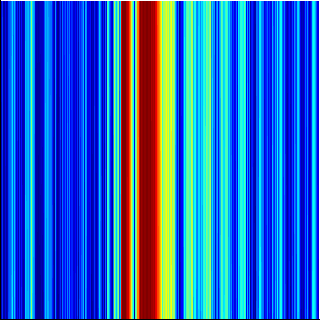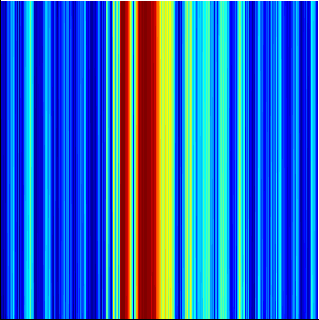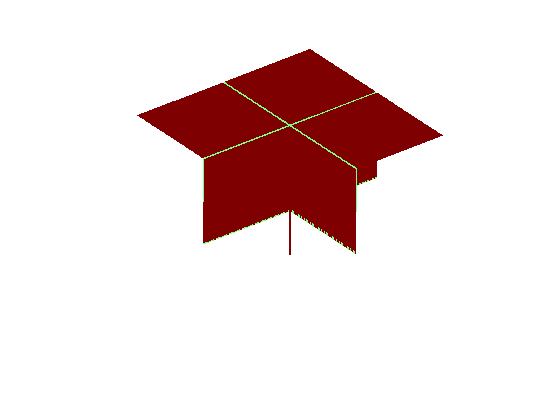A lot of people who want to get people excited about math assert that “Math is fun” and move on from there. However, for most of those they are trying to reach, nothing could be further from the truth. All this attitude betrays is that those who hold it are hopelessly out of touch with their intended audience. Surrounded by like-minded people, they are imprisoned within an impenetrable bubble of their own creation. In addition – perhaps not surprisingly – it betrays a profound lack of empathy. For most people who don’t share this premise, math is about as fun as learning to interpret cuneiform (not that there is anything wrong with that). The point remains – “Math is pointless torture” might be more apt to describe the experience of most. Thus, these efforts are largely ineffective and doomed to failure. They mean well, but are doing it wrong.

Examining a spectrum with evolving window sizes. This illustrates a fundamental uncertainty principle in signal processing. A narrow processing window yields precise information about timing, while a wide window is informative about frequency content. But not both at the same time. Life is about tradeoffs.
If anything, this situation is an instantiation of the expert problem – the fact that experts are different from the people they purport to serve and have a hard time intuiting the specific problems of non-experts, due to a lack of common ground.
To be clear: If one is familiar with the art, there are few pleasures more sublime than mathematical insights cast in mathematical formulations.
But how to get there? With regard to mathematics, most people sit in a well of ignorance so deep that the walls simply cannot be scaled. The slope is far too steep and is also made slippery by accumulated anxiety and dread. For the most part, this is not the fault of these people, but rather the end result of (usually) a decade or more of abysmally poor math instruction, focusing on formalisms instead of good explanations. The majority of people have been cheated out of experiencing this sublime “fun”. Stating it so (that it is indeed fun), doesn’t make it so. Not for most people.
An alternative approach lies in aesthetics. Aesthetic experiences are much more accessible, open to almost anyone, courtesy of the perceptual system (which takes up a quite sizable chunk of cortex in human and non-human primates). This approach sidesteps the problem of limited understanding, which is in itself self-reinforcing and self-limiting.
If intriguing enough, some inspired spirits might endeavor to understand the underlying principles that created the aesthetic experience in the first place.
Therefore, mathematical art is the way to go. Which is just as well, as math is about structures in conceptual space. It is only fair to making it visible (or doing the analogous thing for the auditory system) to a system that was built for extreme performance. So while it might not be justified to say that Math is fun, it is perhaps fair to say that it is beautiful.
I – for one – intend to do my part.
The current approach amounts to nothing less but an intellectual crime. Ironically, it places math education firmly in the obscurantist camp – effectively, for most people. Strong words, to be sure. But it deprives billions around the world of the access to this kind of beauty and insight while keeping the flock of insiders pure and small. In the long term, this won’t do.
Math is so crucial that it could get away with a horrible interface for millennia. Not any more. Accessibility is key. Personally, I’m betting on aesthetics, with Kant: “Beautiful is that which is appealing without interest”. As we can’t presume interest, aesthetics can serve as an important bridge(head).
—
Note: This works for math because internal consistency is its only truth criterion. In most other fields, aesthetics leads straight to the dark side. For instance, attempts at linking aesthetics and scientific truth have been disastrous, from assuming that planets have to have circular orbits to assuming that their orbits have to have specific ratios to string theory. All elegant but misleading nonsense. Akin to stating that a sentence has be true if it rhymes.
Update: It has been brought to my attention that I am not the first one to think of this. I hope this turns into a movement.
h/t Adam Weiss.





Fine diagnosis, and one, among others possible, also fine prognosis.
I agree with all those who think is already sufficiently clear that, for most of people not only math can not be teach mandatorily through ready recipes disconnected from a context, but the traditional way of teaching math has also alienated most people of it. And nerds aside, people’s interest for it can only be awakened if it is taken from the sacred socle, where it was placed, showing to the people the various ways to handle such tool and its practical applications in various fields, as well as showing how it has been misused to perpetuate some power relations.
Math also is one of those powerful memes of technium, of which can really confuse an inclined host.
Math also is one of those powerful memes of technium, of which more than in an symbiotic relationship where both parts use each other, it can really dominate an inclined host.
Which reminds me a comment of a trader once “guess I’ll never stop to thank to heavens for some minds who doesn’t even know the fuckin’ arithmetics for practical and simple goals, have fascination on algebra or trigonometry for the same purposes. If one still doesn’t know how to use a fork, why not use the fuckin’ hands? Or, smart phonies aside, for all those graduate freaks who decides to surf as if it was something like planning the next great invention of mankind, or even worst ones, those buttheads who try do it as if they was hammering nails into a plank using their foreheads”
This is a great post, Pascal! As a product of the American education system myself, I can attest to the fact that the way we teach mathematics is, for the most part, terrible (even in our colleges and universities). Throughout my schooling I always hated math classes, but this is because I didn’t really understand what mathematics is. I’m trying to learn as much about the beautiful art of mathematics as I can on my own now, but I think that the intuitive understanding must come before the rigor.
I’m afraid this is a global problem. I “enjoyed” a math education outside of the US. Pretty much the same all over, as far as I can tell. Strong agreement that teaching intuition should come first. But that would take skill 😉
Hi Pascal, many excellent points here.
Yes! Empathy & honesty are the key to teaching, with knowledge a distant third. Can the teacher admit when he doesn’t know something? When it’s being explained poorly? When the student is lost?
Insisting “math is fun” is like a comedian insisting they are funny. It’s not something you can demand. And you destroy your credibility when you argue against what a student is actually experiencing.
I think we condescend to “let’s make math fun” initiatives, playing along, pretending they are interesting. The trick is there is no trick: the material needs to be genuinely enjoyable. Kids see through the charade and call it out (“I hate math”). Adults often feel the same, but won’t say it as clearly. It’s impolite to criticize a well-meaning but flailing effort to make math enjoyable, so we nervously pretend it is. But if you see a math lesson and don’t want to share it with a friend, it wasn’t fun.
I agree. It’s baffling that experts forget their expertise and don’t relate material in a manner digestable to those without it.
I’m always amazed that we have half our brains dedicated to vision processing, but insist on first conveying information via tiny symbols that rely on often-undeveloped abstract reasoning facilities.
I’m not sure if math is intentionally obscurantist, or if it’s a side-effect of the academic reward system, but either way it’s there. I think the people who feel it is obscure are afraid of saying it. It’s the emperor’s new clothes: “What, are you so daft that you can’t comprehend these lessons which have been used for decades? Nobody else is complaining!” (As everyone else nervously glances around).
I could go on for ages, so I’ll pause here. Thanks for posting this article!
Hi Pascal,
I am curious about the exponent image. Can you explain to me the underlying components of the visual and how it was created. I would like to share it with my son and his math class.
Thank for helping improve math education for kids.
Jennifer
Sorry, but I subscribe to the Math = Fun philosophy & I have it posted over my classroom door. If children only solve math problems out of a book, they will hate it. But is they experience math through solving puzzles, exploring logic problems, & seeing math is everyday situations, they will see the fun & the beauty. My childhood was solving puzzles, building & creating while understanding the mathematical foundation, & playing with math – I never believed it was anything but fun (until maybe college calculus). We can create an environment of mathematical play or not – I choose to play!!
That approach is working so well that about a third of Americans say that they would rather clean the toilet than do math. http://changetheequation.org/press/new-survey-americans-say-%E2%80%9Cwe%E2%80%99re-not-good-math%E2%80%9D
Just because someone likes it doesn’t mean this will generalize. That’s kind of the point: http://miraclemathcoaching.com/exploring-american-attitudes-toward-math/
Pretending that we have methods that work well and in general amounts to wishful thinking at this point. Comforting, but not effective.